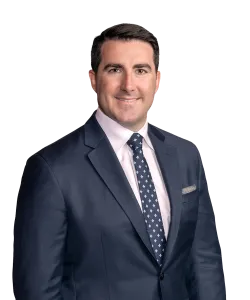Remarks by Acting Assistant Attorney General Matthew R. Galeotti Regarding White Collar Enforcement Priorities
Headlines that Matter for Companies and Executives in Regulated Industries
Remarks by Acting Assistant Attorney General Matthew R. Galeotti Regarding White Collar Enforcement Priorities
On September 18, at the Global Investigations Review Annual Meeting, Acting Assistant Attorney General Matthew R. Galeotti discussed the US Department of Justice (DOJ) Criminal Division’s white collar enforcement priorities, which include health care fraud, procurement fraud, market integrity, crimes associated with Chinese variable interest entities, and foreign corruption. In his remarks, Galeotti highlighted specific examples in many of these enforcement priority categories, focusing on enforcement actions against both individuals and corporations.
Galeotti emphasized that the Criminal Division is continuing to investigate corporations, noting that the Criminal Division’s revisions to the Corporate Enforcement Policy (CEP) reflect pragmatism, even-handed justice, and creating incentives. He briefly highlighted the revisions to the CEP as “(1) a clear path towards resolving corporate investigations without ongoing obligations, (2) the available fine reductions for cooperation and remediation, and (3) the factors that determine the form of a final corporate resolution.” He added that “the CEP crystallizes the benefits to companies that voluntarily self-report, cooperate, and remediate — they will receive a declination, not just a ‘presumption.’”
Galeotti emphasized that these resolutions are to incentivize and reward “good corporate citizenship and holding others accountable.” As such, he clarified that DOJ “will not bring charges against the company” where it “voluntarily self discloses,” “fully cooperates with DOJ’s investigation,” “timely and appropriately remediates,” “disgorges any illicit profits,” and “makes any victim compensation payments.” Galeotti noted that the Criminal Division maintains discretion where there are “aggravating circumstances.”
Galeotti reported that, thus far in 2025, the Fraud Section has charged over 200 individuals with over $16 billion in alleged loss, convicted over 140 individuals, conducted 17 trials, and resolved six corporate cases.
Galeotti’s full remarks are here. See our previous reporting on the revisions to the CEP here.
Omnicare LLC Files for Chapter 11 Bankruptcy Following $949 Million Judgment
On September 22, Omnicare LLC, a subsidiary of CVS Health, initiated a voluntary court-supervised Chapter 11 bankruptcy process after it received a nearly $1 billion judgment in early July. Omnicare provides pharmacy services for long-term care facilities. According to a statement issued by Omnicare, it plans to continue providing its pharmacy and clinical services without disruption while it proceeds through the Chapter 11 process.
In connection with the Chapter 11 process, Omnicare also entered into an agreement for $110 million in debtor-in-possession financing, which according to its statement, Omnicare expects will provide sufficient liquidity to allow the company to continue operations.
See our previous reporting on the Omnicare and CVS Health judgment here and on the verdict here.
Pennsylvania Doctor Sentenced to 14 Years for Illegal Distribution of Opioids and Other Charges
On September 22, Neil K. Anand, M.D., a Pennsylvania-based doctor, was sentenced to 14 years in prison for conspiracy to commit health care fraud and wire fraud, three counts of health care fraud, one count of money laundering, four counts of unlawful monetary transactions, and conspiracy to distribute controlled substances. He was convicted after a trial in April.
According to the government, Dr. Anand created “goody bags” of medically unnecessary prescription medications and conspired to commit health care fraud by submitting false and fraudulent claims for those “goody bags” to Medicare, the US Office of Personnel Management, and other private insurance companies. According to the government, Dr. Anand allegedly dispensed the “goody bags” to patients by pharmacies that he also owned.
The government also alleged that Dr. Anand conspired to distribute medically unnecessary oxycodone as a way to convince patients to accept the “goody bags” of additional medically unnecessary medications. The oxycodone was allegedly prescribed by unlicensed medical interns using blank prescriptions that Dr. Anand had previously signed. According to the government, Dr. Anand prescribed nearly 21,000 oxycodone tablets for nine different patients.
In addition to his 14-year sentence, Dr. Anand was ordered to pay over $2 million in restitution and over $2 million in forfeiture.
The DOJ press release is here.
DOJ Criminal Division Expands Health Care Fraud Unit to Massachusetts
On September 23, the DOJ Criminal Division announced that it is expanding its Health Care Fraud Unit’s New England Strike Force to the District of Massachusetts. The expansion will bring increased federal enforcement resources to a district that already has a national reputation in health care investigations, enforcement, and prosecutions.
According to Galeotti, “The expansion of the New England Strike Force to Boston will ensure that we are focused, efficient, and coordinated in our efforts to root out both individual and corporate bad actors engaged in criminal misconduct in the health care marketplace.” US Attorney Leah B. Foley for the District of Massachusetts said that the “Strike Force model will act as a force multiplier, increasing resources and promoting even greater successes.”
The New England Strike Force was launched in June 2022, and as part of the expansion, will coordinate with the US Attorney’s Office’s Health Care Fraud Unit, Federal Bureau of Investigation, US Department of Health and Human Service’s Office of Inspector General, US Food and Drug Administration, US Drug Enforcement Administration, US Department of Homeland Security Investigations, and several other federal and state agencies. The expansion likely means an increase in investigations and possibly enforcement out of the District of Massachusetts.
The DOJ press release is here.
Contacts
- Related Industries
- Related Practices







